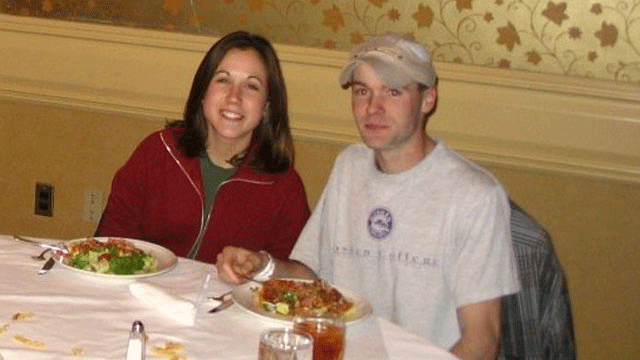
(Justin Gillette)
A big bowl of pasta covered in creamy sauce and gooey cheese makes a pretty tasty, albeit heavy and fattening meal. Follow that up with gobs of chocolate for dessert.
You might think that’s the diet of an overweight couch potato, but it’s actually what’s on the menu for many athletes running the New York Marathon this weekend.
Thankfully, preparing for an endurance sport requires endurance eating. Filling up on carb-laden foods like pasta before a big race is a way to boost energy. The practice is famously called “carbo loading.”
“Simply put, carbohydrates are stored in the body as glycogen. Glycogen is the most efficient source of energy used by the body when moving. During exercise, the body uses glycogen stores to propel itself,” said running coach Brendan Cournane.
For a race like a marathon, which covers 26.2 miles, athletes are on their feet for several hours at a time, so muscles need to be super-fueled before hitting the pavement.
That usually means Italian restaurants are packed by runners pre-marathon, in the belief that pasta will lead to better endurance and performance.
“This theory goes back many decades when endurance athletes would often deplete themselves of carbohydrates for a few weeks before a major race, then gorge on carbs within 24 – 48 hours before the event,” said Cournane.
“It was believed that the depletion process would allow the body to store more carbohydrates (and create more glycogen) in this manner. Thankfully, further studies have shown the fallacy in this approach. Most endurance training programs now favor a well-balanced diet throughout training, with the ‘carbo loading’ dinner more a tradition than a necessity.”
Jan Hangen, who is a clinical nutrition specialist at Children’s Hospital in Boston, agrees, and cautions that eating healthy isn’t just a habit you can pick up right before the starting gun goes off. “The most important thing a distance runner can do is have a consistent healthful diet throughout the year and not just during training season.”
Top runners will graze on bits and pieces of carb and protein heavy foods all day, everyday, as they get closer to race day, along with drinking lots of water to prevent dehydration.
Justin Gillette, who ran more than 20 marathons this year and has won 36 marathons so far, agreed. “Training at a higher volume of miles, I hit 120-135 per week, causes your body to crave the proper fuel. Due to eating such a high carb diet, my wife and I do not stress over eating pasta the night prior to a marathon.”
Although Gillette admits to also often eating Taco Bell before and after races because he said “my body responds well to their food.”
While endurance athletes can and should increase calories during training, Hangen suggests a balanced approach.
“The three tricks of the trade are fat, fiber and protein. Before the marathon if you have big bowls of pasta, that’s a rapidly acting carbohydrate, so you need to couple that with fat, fiber and protein to slow it down and let you body absorb it.”
The magic combo can be achieved by using sauce on your spaghetti that includes olive oil and ground turkey or beans.
“Spaghetti Bolognese” is what athlete Tim Van Mieghem eats the night before. Van Mieghem ran the Maui marathon this year. “And I drink a glass of water every time I wake during the night before a race. I hate cramping up!” he said
Athlete Ken Locascio, who does several marathons and triathlons per year cautions, “Eat plenty of carbs beforehand but avoid feeling stuffed from too much pasta. The right balance makes a big difference. Toilet stops are not welcome in the middle of a marathon!” He speaks from a little too much experience.
Sadly for Locascio, when he recently ran Boston, pasta wasn’t an option. “Somehow we walked the city for two hours that day without running across an Italian restaurant. I settled for French toast with lots of syrup.”
For some runners with gluten intolerance, like New York athlete Sara Laytham, finding the right pre-race balance of foods can be challenging, but not necessarily a downfall.
“I wound up not eating any pasta and very little rice and bread before the 2004 marathon… but it was my best race time and I felt the best when it was over,” she said.
Instead of the standard carbo loading, Laytham said she ate a healthy mix of “veggies, sushi, protein, fruit,” and she drank wheat grass to boost her iron level. “You have to do what’s best for your body” she said.
And its not just the night before, but also the morning of the big day that matters in the long run.
Triathlete Tim Maley has the perfect tasty combo idea for the morning of the race. “I eat a breakfast consisting of little chocolate donuts, tea/lemonade mix and a banana. This holds me over until I have some Goo and Gatorade before and after.”
Once the race is finished, the indulgence can begin. “Seefood! If you see food, eat it!” joked Coach Brendan Cournane, who is often recognized out running in his funky shorts covered in little red pepper designs.
Locascio prefers his post race treats in liquid form. “The best beer I have ever tasted was sitting in the sun at the 27th mile!” he said.
As tempting as the beer-as-recovery-food idea might be, Hangen prefers chocolate milk, which has the right ratio of four grams of carbs to one gram of protein. Once runners cross the finish line, “they’ll need fast acting carbs within 15 to 30 minutes,” she said.
Even better than that, Hangen gives the okay to athletes wanting to further indulge their sweet tooths. “Chocolate is a medicine. It has magnesium and that’s one of the minerals that may prevent leg cramps. Dark chocolate is best.”
Good advice! With the New York marathon around the corner, there might be a rush on the candy stores!
